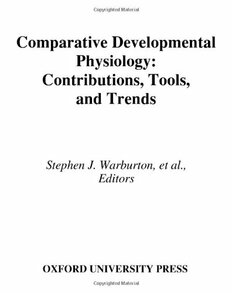Download Comparative Developmental Physiology: Contributions, Tools, and Trends PDF Free - Full Version
Download Comparative Developmental Physiology: Contributions, Tools, and Trends by Stephen J. Warburton, Warren W. Burggren, Bernd Pelster, Carl L. Reiber, John Spicer in PDF format completely FREE. No registration required, no payment needed. Get instant access to this valuable resource on PDFdrive.to!
About Comparative Developmental Physiology: Contributions, Tools, and Trends
Comparative developmental physiology is a growing discipline examining a diversity of organisms as they transform from single cells to mature, reproductive individuals. This collection of original, innovative essays emerged from a Roundtable on Comparative Developmental Physiology held in Glen Rose, Texas in the summer of 2002. This meeting brought together investigators studying the physiology of developing animals in an effort to identify the field's potential contributions to biology. The participants honed in on common emerging themes and future goals, which are reflected in the chapters within. The nascent community of comparative developmental physiologists was challenged to amplify the power of data collection and tool development by focusing on a few select model organisms, while still employing the power of the broader, more traditional comparative approach. Evolution has provided comparative developmental physiologists with remarkable biological diversity, which they have used to investigate a broad range of questions critical for understanding how life works. This goes beyond the basic nuts and bolts of cellular mechanisms to the functional whole, from the mechanistic level to behavior within and between organisms. The union of developmental biology with the breadth of comparative physiology holds much promise for a deeper understanding of evolutionary processes.
Detailed Information
| Author: | Stephen J. Warburton, Warren W. Burggren, Bernd Pelster, Carl L. Reiber, John Spicer |
|---|---|
| Publication Year: | 2006 |
| ISBN: | 9780195168600 |
| Pages: | 236 |
| Language: | English |
| File Size: | 3.572 |
| Format: | |
| Price: | FREE |
Safe & Secure Download - No registration required
Why Choose PDFdrive for Your Free Comparative Developmental Physiology: Contributions, Tools, and Trends Download?
- 100% Free: No hidden fees or subscriptions required for one book every day.
- No Registration: Immediate access is available without creating accounts for one book every day.
- Safe and Secure: Clean downloads without malware or viruses
- Multiple Formats: PDF, MOBI, Mpub,... optimized for all devices
- Educational Resource: Supporting knowledge sharing and learning
Frequently Asked Questions
Is it really free to download Comparative Developmental Physiology: Contributions, Tools, and Trends PDF?
Yes, on https://PDFdrive.to you can download Comparative Developmental Physiology: Contributions, Tools, and Trends by Stephen J. Warburton, Warren W. Burggren, Bernd Pelster, Carl L. Reiber, John Spicer completely free. We don't require any payment, subscription, or registration to access this PDF file. For 3 books every day.
How can I read Comparative Developmental Physiology: Contributions, Tools, and Trends on my mobile device?
After downloading Comparative Developmental Physiology: Contributions, Tools, and Trends PDF, you can open it with any PDF reader app on your phone or tablet. We recommend using Adobe Acrobat Reader, Apple Books, or Google Play Books for the best reading experience.
Is this the full version of Comparative Developmental Physiology: Contributions, Tools, and Trends?
Yes, this is the complete PDF version of Comparative Developmental Physiology: Contributions, Tools, and Trends by Stephen J. Warburton, Warren W. Burggren, Bernd Pelster, Carl L. Reiber, John Spicer. You will be able to read the entire content as in the printed version without missing any pages.
Is it legal to download Comparative Developmental Physiology: Contributions, Tools, and Trends PDF for free?
https://PDFdrive.to provides links to free educational resources available online. We do not store any files on our servers. Please be aware of copyright laws in your country before downloading.
The materials shared are intended for research, educational, and personal use in accordance with fair use principles.

